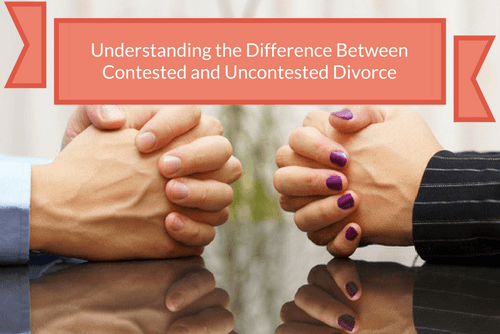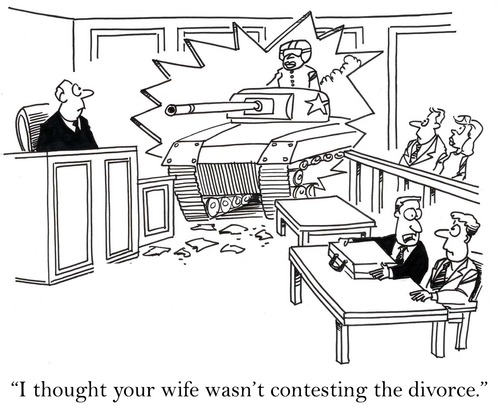When spouses find themselves with irreconcilable differences they often seek information about the divorce process. The time it takes to get a divorce, the waiting period for filing a petition and getting a divorce decree, residency requirements, separation prerequisites, court costs and legal costs vary depending on jurisdiction and the type of divorce that is filed. Separating couples need to educate themselves on the distinction between a contested and uncontested divorce.
Contested Divorce
A contested divorce is one where the spouses fail to agree on how to end their marriage peacefully. When a couple cannot resolve a divorce even with the help of a Dallas divorce lawyer, the last resort is to go to court. Contested divorces are popular because there are many different matters to solve in order to terminate a marriage.
Grounds for a Contested Divorce
A contested divorce may be based on either at-fault grounds or no-fault grounds. The at fault grounds for a contested divorce include adultery, domestic violence, abandonment, spouse’s confinement in a mental institution, and felony conviction.
A contested divorce involves issues that cannot be settled outside the courtroom like division of property, child custody, and child support. The courts are usually involved in deciding on the division of assets, custody and visitation, and the spouse who will live in the home.
A Divorce Petition
A contested divorce starts when your divorce attorney files a divorce petition in court and serves the petition to your spouse. Most state laws on divorce require that your spouse respond within a certain period of time- in most cases, 30 days. If your spouse fails to respond within the time limit in your state, he/she is considered to be in default and the court will give you a default judgment of divorce. However, if your spouse responds, the case will go through the litigation process including discovery and mediation and if needed, a final trial.
Discovery
Discovery is the part where spouses obtain information from one another regarding marital assets, income, and other matters relevant to the case. Discovery is carried out through written interrogatories, depositions, and document requests.
Settlement
Most judges encourage spouses to reach agreements before they resort to court. The judge could order the spouses to attend mediation sessions with a third party. If the spouses fail to agree at the settlement stage, the case is forwarded to a divorce court.
Trial
During a divorce trial, the spouses are questioned, witnesses are cross-examined, and lawyers from both sides make their closing statements. The judge will make the final decision on all issues. The time it takes for the judge to reach a decision is dependent on the complexities of your case.
So How Is An Uncontested Divorce Different From Contested Divorce?
Although no divorce is resolved without conflict, in an uncontested divorce the couple reaches an agreement, without the necessity of the court’s intervention, to conclude their marriage, leaving no unresolved or disputed issues. This agreement is fast, simple, convenient, private, and inexpensive. The cost savings and efficiency of an uncontested divorce is the major benefit highlighted by divorcing couples.
Filing a Petition
An uncontested divorce begins the same way as a contested divorce. However, uncontested divorces have streamlined paperwork whereby child and property custody information is filed together with a statement showing the reasons for divorce. If the other spouse does not respond to the divorce notice within the time limit in your state, the court may grant the divorce. If the other spouse does not agree to the divorce and files the necessary documentation showing their disagreement, the court will not grant an uncontested divorce.
Deliberations
In an uncontested divorce, the absence of a court trial and an attorney amount to low costs. However, it is advisable to involve a divorce lawyer to act on your behalf like a third party. Unlike a contested divorce where all the disclosed information is publicized, in an uncontested divorce there is less information filed in the court that will get into public record. Therefore, spouses who agree to a non-contested divorce are able to keep their affairs private.
The main distinction between a contested divorce and a non-contested divorce lies mainly in the presence or absence of numerous court proceedings. If you intend to resolve minor issues, a non-contested divorce is the best approach. In case there are complex issues that cannot be resolved amicably, the best resort would be the contested divorce.
For further information on either type of divorce case and how it may be applicable to your life situations, please contact the Law Offices of David S. Kohm & Associates for assistance today.














